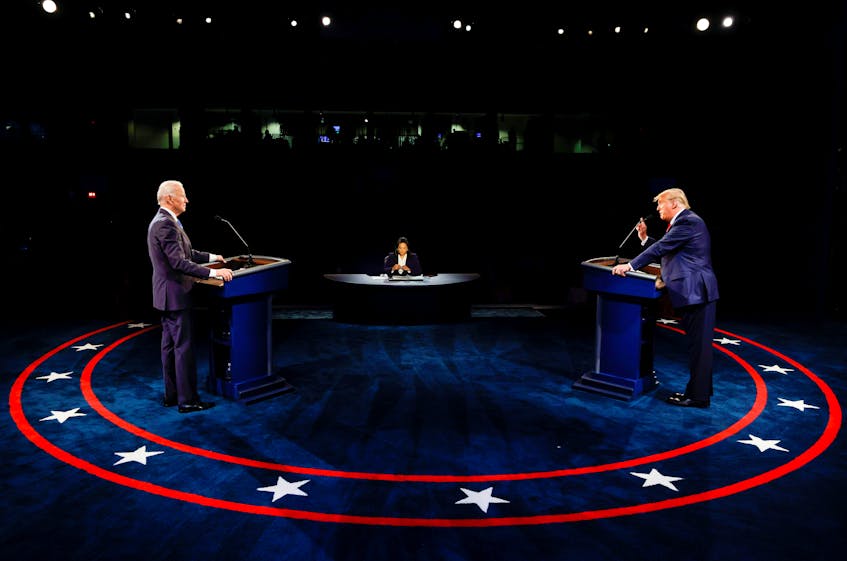On Nov. 3, the United States, our closest neighbour and largest trading partner is going to elect a leader for the next four years.
Early voters are already casting ballots in favour of the incumbent Donald Trump or former vice-president Joe Biden.
Here in Atlantic Canada, we can’t influence the outcome, but we are going to have to live with it.
Peter McKenna, chair of the department of political science at the University of Prince Edward Island, has spent his professional career studying the nuances of Canada’s relationships with other countries. A common refrain when talking about U.S. politics as a Canadian is, “Why do you care? It isn’t your country.”
McKenna, however, believes that it’s in our best interest to focus on the political climate of our southern brethren.
“We’re talking about a country that’s Canada’s most important foreign policy relationship, bar none,” says McKenna. “It’s important for us to get along with that country and to deal with that country and there’s a lot at stake.”
“There’s a lot of family connections between Canadians and Americans, a number of Canadians who work in the United States, who travel back and forth.”
In ordinary times
Economics is one measure of connection between countries, and the flow of goods is a linchpin of our relationship to the United States.
“Roughly 75 per cent of Canadian exports go to the United States. It’s our most significant trading partner. So, that’s obviously important, because many of the provinces in Atlantic Canada export a significant amount of goods to the US market place.”
The United States has also been a military ally. Given a shared cultural history, Canada and the United States have often found their interests to be aligned.
“There’s lots of military cooperation between the US military and the Canadian military,” says McKenna. “Lots of discussions, lots of advantages that the Canadian military sees from working with the US armed forces. There’s lots of intelligence exchanges between the two countries.”
McKenna is not a fan of the idea that Canada follows where America leads, however.
“It’s a mistake to argue that the United States dictates to Canada what it can and cannot do,” says McKenna. “That doesn’t stop the United States from trying, but Canada has not, in the past, shied away from taking a different position than the United States. Most obviously in the case of our relationship with Cuba.”
But, he points out that it's not in Canada's best interests to pick a fight with the U.S.
“Nor is it a wise or intelligent move for us to be speaking publicly in a negative way about the United States, although it’s happened,” he adds. “The Canadian government, members of the foreign policy establishment, prefer to express these things quietly behind the scenes.”
Beyond raw economics or military strategy, the fact is that Canadians and Americans know each other.
“There’s a lot of family connections between Canadians and Americans, a number of Canadians who work in the United States, who travel back and forth.”
In our times

If things were normal, there would be more value in digging into the policy nuances of each candidate’s platform, to see how Joe Smith’s softwood lumber policy might affect New Brunswick, or how John Doe’s stance on fisheries might impact Newfoundland or Nova Scotia. Our preferences might reflect this nuance.
As 2020’s refrain goes, things are not normal. Most people are not travelling as the pandemic rages in the United States and resurges outside the Atlantic Bubble.
Things are not normal to the extent that Trump has openly questioned the validity of his own country’s election apparatus and has played coy with the idea of a peaceful transition of power should he lose.
Biden, an establishment candidate if there ever was one, would be normal except that at 77, should he win, he would immediately become the oldest individual ever elected to the presidency, a record held by his current opponent.
And of course, things are not normal because of a global pandemic.
Still, let’s take a look at McKenna’s impressions of each candidate and weigh what their election might mean for the Atlantic region and Canada in general.
Tariff man

McKenna makes it clear the stark contrast between the world views of Trump and Biden outweigh mere policy concerns. The reelection of Trump would be bad for the East Coast.
“It wouldn’t be good news for Canada, for sure. It wouldn’t be good news for Atlantic Canada. It’s been a tough slog for the last four years, and to have Trump unfettered, with no rails, with no off-ramps, for another four years? That’s going to really have a significantly negative impact on Canada/US relations.”
That's not to say there isn’t the possibility for improvements around the margins. Maybe an individual deal goes through, a couple of companies make a profit. But it’s a little bit like getting excited by the complementary buffet on a cruise ship that’s sinking.
“Right now, the relationship between Canada and the United States is probably the worst it’s been in about 70-plus years. But let’s be clear here - any animosity or negativity is coming from the US side, not the Canadian side. If anyone’s to blame here for why the relationship’s the worst it’s been in 75 years, it’s because of Donald Trump, pure and simple,” says McKenna.
“He basically thinks that Canada is ripping off the United States because we have a trade surplus and Trump doesn’t like trade surpluses.”
"...Quietly, behind the scenes, they’ve got all their fingers and toes crossed and they’re praying and saying, please, please, defeat Donald Trump on Nov. 3.”
It's not enough to rely on the hope of making advantageous trade deals with whichever administration is in power come January 2021. Trump has demonstrated he will cancel, pull out of, or otherwise end any agreement for any number of reasons. NAFTA, the Iran nuclear deal, the Paris Climate Agreement. His behaviour is unpredictable, McKenna says, and that instability is anathema to a productive US/Canada relationship.
“No Canadian government is going to be talking publicly about what their preferences are, especially with a very sensitive and tricky and cagey and angry Trump administration, a vindictive Trump administration and impulsive Trump administration,” says McKenna. “But quietly, behind the scenes, they’ve got all their fingers and toes crossed and they’re praying and saying, please, please, defeat Donald Trump on Nov. 3.”
As far as the most pressing issue - controlling the COVID pandemic and allowing some kind of travel between countries to resume - the Trump administration previewed its post-election approach recently when Chief of Staff Mark Meadows went on CNN to declare, essentially, the White House was moving away from mitigation and pivoting to therapeutics and vaccines.
Trump, with access to some of the greatest infectious disease experts on the planet, is taking the advice of Scott Atlas, a neuroradiologist, over Anthony Fauci, an immunologist. McKenna believes this is the defining danger of a second Trump presidency, as it empowers a leader who prefers comforting lies to uncomfortable truths.
“Imagine a Trump administration getting a second term and just basically saying, ‘Let ‘er rip, and let’s opt for the herd immunity idea and have 1.5 million Americans dead,’” says McKenna.
“That’s just unimaginable. Tony Fauci knows more about it than Atlas is gonna know in his lifetime, and he’s shunted to the side and mocked and berated. And this Atlas guy has got strange ideas on COVID, is given prime place. He’s the one that has the ear of the president. That tells you all you need to know.”
Back to the Future

If nothing else, McKenna believes that a Biden administration would allow a return to something like the relationship Canada and the United States enjoyed in the years before up to 2017.
“A Biden administration would be a return to traditional Canada-US diplomatic behaviour. Biden was vice-president under Obama for eight years, so he knows Canada. He knows the file. He knows the issues,” says McKenna.
“I think there’s an ideological compatibility there that would not be there under a second term Trump White House. I think that any time you’ve got an ally in the White House, a friend in the White House, someone that you get along with and has the same kinds of values and overall interests, that’s a good thing for Canada.”
That isn’t to say that a Biden administration would be an automatic boon to all aspects of the East Coast economy. One such potential complication is in the Biden camp’s approach to climate change.
“Under the Biden plan for climate change, he does talk about something called Border Adjustment Tariffs,” says McKenna. “If there’s something that’s being imported into the United States that contributes to carbon emissions in the atmosphere, he’s talking about imposing a tariff on that. There is potential there that we could get hit by these border adjustment tariffs and that could also apply to Atlantic Canada.”
"...If there’s a plan, if there’s a significant effort, if there’s federal leadership on COVID, on mitigation, then that’s good for Canada, and I think you're going to see that. I think that Joe Biden understands that."
A Democratic administration also doesn’t mean a total reversal of Trump’s America-first thinking. Every country acts in its own self-interests. But for there to be productive relationships on trade or otherwise, leaders and governments need to be aware of the fact that other governments have legitimate interests, even when those interests conflict.
“At least with the Biden administration, Canada would have a sympathetic ear in Washington. At least we would have somebody there who would be reasonable, and that we could make a legitimate case to, as to why we should get an exemption from such measures. Under Trump? Forget it.”
If Biden is elected, McKenna believes the post-election period, when the new administration is trying hard to separate itself from Trump policies, could be an advantageous time for the East Coast. He cites stalled negotiations over softwood lumber tariffs as an example.
“There would at least be an initial honeymoon period, if I can call it that, between the United States and Canada, if Biden were elected in November,” says McKenna, adding that it could perhaps lead to some sort of long-term agreement on the lumber issue.
On COVID, McKenna is hopeful that Biden would at least mark the beginning of a rationally-conducted strategy in the United States. The East Coast needs an open border to begin recouping lost tourism dollars, to say nothing of bringing families back together.
“We want to open the border, and we want Americans to travel here and to come here and to spend money here in Atlantic Canada. I think if there’s a plan, if there’s a significant effort, if there’s federal leadership on COVID, on mitigation, then that’s good for Canada, and I think you're going to see that. I think that Joe Biden understands that,” says McKenna.
“This has to come from the federal level, it has to come from the national government, there has to be a plan that extends to all states and territories, and that needs to be led by the national government. And he’s committed to doing that.”
The Bottom Line
The East Coast is one part of a relatively small nation living alongside an economic and military behemoth. Whatever door the behemoth steps through on Nov. 3, we’re going to feel the reverberations of that step.
“It’s just hard to fathom how we would be able to negotiate and manoeuvre and just diplomatically engage with a Trump administration that you’d have to think would only become more authoritarian, less likely to espouse democratic principles,” says McKenna.
“It’s one that would be increasingly insular and divided and protectionist and nationalist. Those are all bad developments for Atlantic Canada, and for Canadians in general.”









